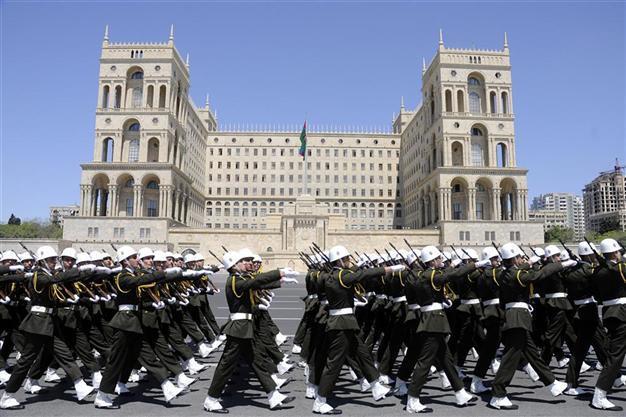Azerbaijan using drug charges to stifle dissent, HRW says
BAKU - Agence France-Presse

Cadets of Azerbaijan's High Military School march across the city during a parade in central Baku, on May 10, 2013. The parade is timed to mark the 90th anniversary of the former President of Azerbaijan Heydar Aliyev. AFP PHOTO / TOFIK BABAYEV
Azerbaijan is increasingly using false charges of drug possession to arrest government critics in a bid to stifle dissent ahead of presidential polls in October, Human Rights Watch said May 27.
Four activists critical of strongman Ilham Aliyev’s government were detained between March and May this year on “bogus” drug charges as part of a growing crackdown on civil society groups in the former Soviet state, the rights group said in a statement.
“The latest cases are part of an intensified government campaign against its critics as elections grow near,” Giorgi Gogia, senior South Caucasus researcher at Human Rights Watch, was quoted as saying in the statement. “These arrests and beatings send a very clear message to anyone who wants to engage in serious activism.” The four men, a blogger, an opposition activist, a youth movement member and an imam, were detained by police after they were allegedly found in possession of small amounts of narcotics.
The activists, who remain in pre-trial detention, all deny the charges and three of the four say they have been badly beaten by security officials while in custody, the rights group said. Any display of public discontent or political dissent usually meets a tough government reaction in Azerbaijan. Earlier this year security officials suppressed a rare spate of protests, including one against alleged hazing in the army, and detained scores of activists across the country.
Aliyev has been in power since succeeding his father Heydar, a former KGB officer and Communist-era boss. He looks almost certain to win the presidential election in October. Human Rights Watch says authorities have previously used unfounded allegations of drug and weapon possession to detain critics, arresting five activists on drug charges between August 2011 and May 2012.
